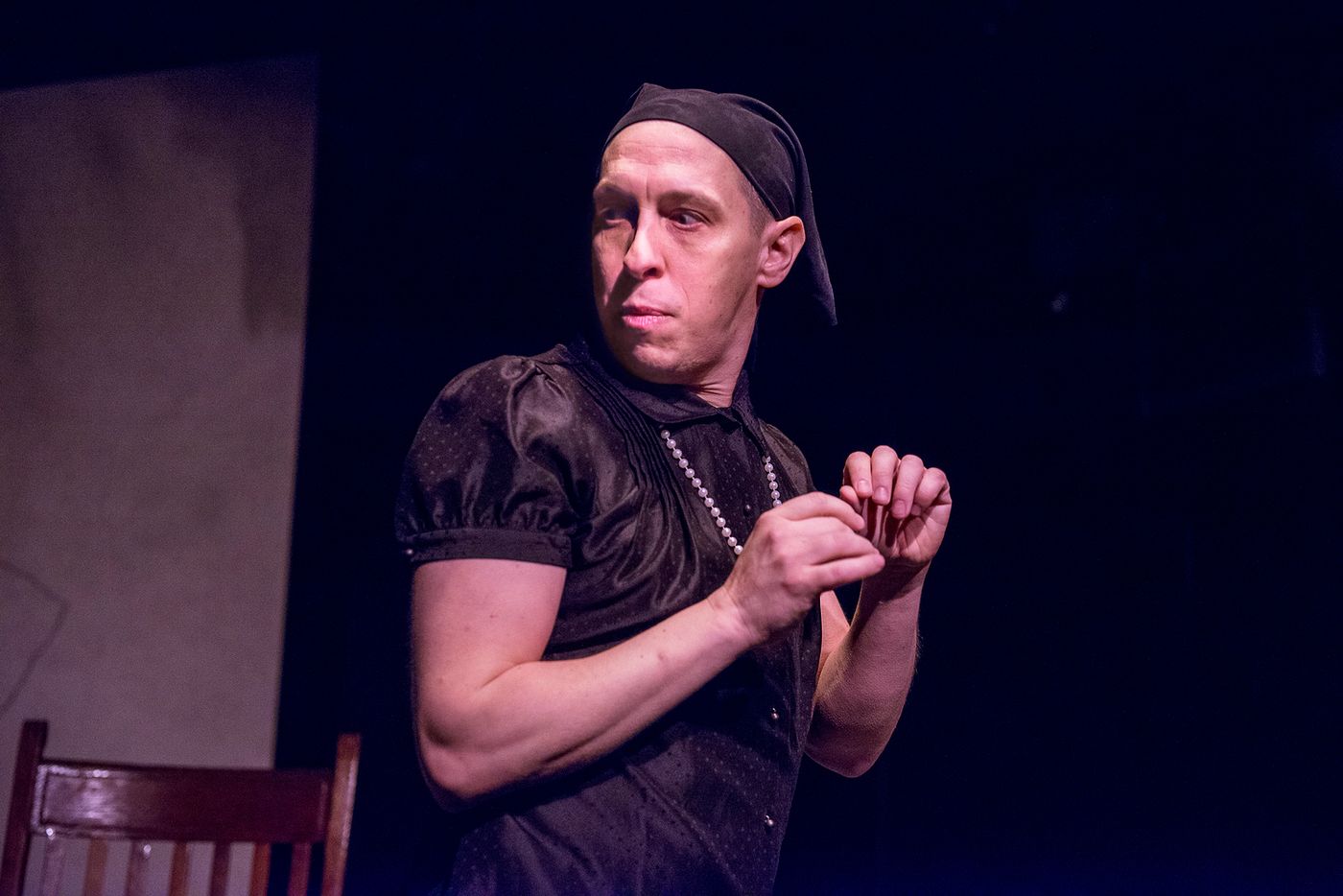Review: I AM MY OWN WIFE at the RICHMOND TRIANGLE PLAYERS & 5TH WALL THEATRE: An Ominous (And Riveting) Trip Down Memory Lane…

I must preface this write-up by commenting that this limited engagement of I AM MY OWN WIFE plays through the 17th of March...
And this play, a somewhat epistolary chronicle of one Charlotte von Mahlsdorf's uncompromising subsistence to live as a transvestite through the bleak travails of Nazi and Communist-occupied Berlin, is a historical powerhouse...
And this particular production, evolved from the Firehouse Theatre's show directed by Morrie Piersol in 2006, is immeasurably serviced again by Piersol and the reenlistment of his star: a lone and seamless Scott Wichmann who inhabits every single multigenerational character in the piece with deft grace.
If I may digress towards a brief, personal note: seeing this play felt like "Old Home Week" for me for wistful reasons. First in that it brought back fond memories of Wichmann playing forty characters in Becky Mode's FULLY COMMITTED back in 2001 (I was 16 at the time). And secondly: this play, written by Doug Wright and winning him the Pulitzer for his superlative effort, reintroduced me to his other play and 2000 film, Quills (though when I discovered Quills at 15, I might have been a tad young for some of its more mature elements). Indeed, the indelible impression Quills left on me was the meta-fascination of writing about writers - a theme I often find myself attempting with my own extemporanea.
This analytical affection of Wright's was marginally revisited with the transcription of whole sections of I AM MY OWN WIFE directly from his first person interviews with von Mahlsdorf. Wright himself appears as a supporting character in this "Memory Play," and his textual inclusion doesn't feel indulgent. As a gay man, Wright's initial fixation with von Mahlsdorf stemmed from her longevity through decades of fascistic ignorance. Yet his obsession - and subsequent moral conundrum - peaked with the discovery of a spottily-detailed act of betrayal presumably carried out by von Mahlsdorf herself. This is the principal focus of a second act that is both differently reflective, and ever-so slightly cynical.
This production itself has given Wichmann and Piersol a lot to play with, the most visible accessory being Andrew Bonniwell's subtle light design. His gradation of color and shade give each of Wichmann's characters atmosphere and context, amped up by spot-on cues orchestrated by stage manager Emily Sanford Hicks. Additional earmarks of note go to Frank Foster's simple yet schismatic set, Amanda Durst's phenomenal dialect coaching, Ryan Corbitt's period sound recordings, and Lucian Restivo's (miniaturized) props.
If I may close with an addendum: I was fortunate enough to be present at the March 11th performance where Wichmann and Piersol were gracious enough to give a talk back recounting their twelve year journey with this play.
"It was neat to go back where we left off," Piersol explained. "In this [production], we got to explore and peel the onion back and apply some new things we hadn't seen before."
Wichmann added: "The apparatus of the storytelling is so specific and so nuanced and so well done - it really is a testament to how well put together this show is."
When questioned about the task of not only performing in a one-man show but returning to it after over a decade, Wichmann affectionately explicated as to the crucial need to having an attentive audience present as his faculties cascade through the emotional deluge that is educing thirty-five different characters of varying accents into being.
"I can feel the audience lean in and kind of say, 'Hey, let's make this thing together,'" Wichmann happily explained. "You do feel the audience want to build this with you."
Wichmann and Piersol touched on a variety of particulars in relation to Charlotte von Malhsdorf; a further account of her life exists in Rosa von Praunheim's 1992 documentary Ich bin meine eigene Frau ("I Am My Own Woman").
Apart from being a cultural celebrity in Germany, von Malhsdorf spent most of her years as a curator to a museum that displayed furniture and other "everyday items." Parenthetically, the audience was pleased to hear that the von Malhsdorf's place of legacy - the Gründerzeit Museum - remains in operation to this day (https://www.museumsportal-berlin.de/en/museums/grunderzeitmuseum-im-gutshaus-mahlsdorf/ ).
Incidentally, concomitant issues of posterity and cultural relativism were also discussed; these notions specifically pertained to the issues faced by transgendered people living in today's age.
"I can't imagine how [Doug Wright] must feel - this being more relevant today than when this was written in 2004," remarked Piersol.
Ultimately, I AM MY OWN WIFE is a "haunted play," as Wichmann puts it. To be sure, the characters he conveys feel ghostly in the sense that their actions, congenial or abusive, carry a hushed aura; a cyclical uncertainty that forces us, the onlookers, to dissect our own sensibilities. Given how von Malhsdorf was able to maintain the bulk of her composure through such blighted years of woeful tyranny, what soul could altogether condemn her - or even Lothar Berfelde (her birth name) - for misguided footsteps through the allegorical minefield that was her home, shrouded by years of despondency?
My hope is that something can be learned from I AM MY OWN WIFE; what that something is remains to be found or, perhaps, even dusted off - like an old piece of furniture - in the hearts and minds of the audience.
Just to reiterate: I AM MY OWN WIFE plays through March 17th at the Robert B. Moss Theatre of the Richmond Triangle Players, and is a collaboration of the 5th Wall Theatre.
Reader Reviews
Videos

